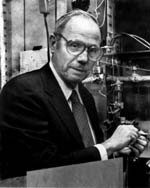UC
Berkeley physicist John Reynolds, known for his work on isotope
dating of rocks and meteorites, has died at 77
09
Nov 2000
By
Robert Sanders, Media Relations
A
print quality photo of Reynolds is available for download
|



John
H. Reynolds, professor emeritus of physics. Saxon Donnelly
photo.

|
Berkeley
- John H. Reynolds, professor emeritus of physics at the University
of California, Berkeley, and a pioneer in the isotopic dating
of rocks and meteorites, died at his home in Berkeley on Saturday,
Nov. 4, at the age of 77. He was recovering from pneumonia
when he suffered a pulmonary embolism.
Reynolds
had been a member of the College of Letters & Science faculty
at UC Berkeley since 1950, served as chair of the physics
department from 1984 to 1986, and retired in 1993.
He
is best remembered for his research on isotopic and elemental
measurements of the noble gases - helium, argon and xenon
- which made it possible to determine the age of both terrestrial
rocks and meteorites. He discovered that an excess of xenon
gas trapped in stony meteorites was a decay product of an
extinct isotope of iodine. Using sensitive mass spectrometry
to measure isotopes of iodine and xenon, he was able to estimate
the time between creation of the isotopes inside a star and
when the meteorites - and the planetary bodies they were derived
from - formed.
These
accurate measurements provided a reliable chronology for the
early solar system. Among the surprises was that the Earth
had formed a relatively short time - between 120 and 290 million
years - after its gas and dust were produced in a nearby supernova
explosion.
His
research group discovered and developed another technique,
argon-argon dating, for determining the age of young rocks.
The technique had much to do with the proof of the theory
of continental drift and sea floor spreading. It also helped
scientists interpret the origin, history, age and composition
of the moon from lunar soil samples.
"Argon-argon
dating, the most important and most versatile dating method
today, was discovered and pioneered in 1966 by two young scientists
(Grenville Turner and Craig Merrihue) working in his laboratory,"
said Paul Renne, former director of the Berkeley Geochronology
Center and an adjunct professor of earth and planetary science
at UC Berkeley. "John was a real luminary in the field of
geochronology, and his death is a tremendous loss."
With
the assistance of National Science Foundation and Fulbright-Hayes
Research Awards, Reynolds established noble gas isotope laboratories
at the Universidade de Coimbra, Portugal, the University of
Western Australia, and the Universidade de Sao Paulo, Brazil.
The latter became a center for isotopic dating used by geoscientists
throughout Brazil and much of South America.
Following
retirement, Reynolds remained active at the Lawrence Berkeley
National Laboratory's Center for Isotopic Geochemistry and
was a valuable resource to astrophysics graduate students.
He was also an avid sailor.
Born
April 3, 1923, in Cambridge, Mass., he attended Harvard College
as an undergraduate, and received a PhD in physics from the
University of Chicago in 1950. He served with the U.S. Navy
in the South Pacific during World War II.
Reynolds
received numerous distinctions in his career, including the
J. Lawrence Smith Medal of the National Academy of Sciences;
the NASA Exceptional Scientific Achievement Medal; the Leonard
Medal from the Meteoritical Society; Doctor, Honoris Causa
from University of Coimbra, Portugal; the National Science
Foundation Cooperative Research Award and the Berkeley Citation.
He
was a Fellow of the California Academy of Sciences. He was
also elected to the National Academy of Sciences in 1968 and
the American Academy of Arts and Sciences in 1986.
He
is survived by his wife, Ann Reynolds, and children Petra
of San Jose, Karen Stein, Brian and Horace of Berkeley, and
Amy of San Francisco. A memorial service will be held at UC
Berkeley's Faculty Club on Nov. 16 at 4 p.m. Contributions
may be sent to the Department of Physics, LeConte Hall, University
of California, Berkeley, CA 94720-7300 and to The Visiting
Nurses Association.
###
A
print quality photo of Reynolds is available for download
.
|